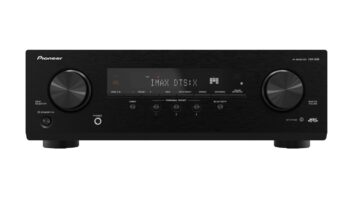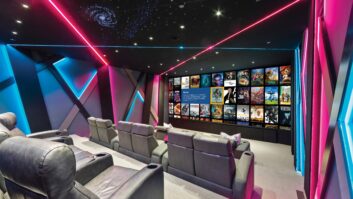Despite the economic gloom, Masao Kawabata, chairman/CEO of Pioneer North America, believes his company’s strategy of moving its brand and products upscale will work during these tough economic times.
In this exclusive interview with TWICE, his first since becoming chairman/CEO here in the U.S., Kawabata addressed issues concerning the Kuro brand, Pioneer’s partnership with Sharp, the HDTV market, its leadership in car electronics as well as the economic downturn and recent changes at retail.
Kawabata, a 37-year veteran of Pioneer, joined Pioneer North America in his current post this past June, replacing popular and well-respected Tom Haga, who retired.
TWICE: What effect will the demise of Tweeter and Circuit City’s Chapter 11 filing have on the CE industry in the fourth quarter and beyond?
Kawabata: We are very saddened about what has happened to Tweeter and Circuit City. We have had long relationships with both companies and believe the industry will feel a great loss without such strong brands in the market. Plus, our hearts go out to those families without work this holiday season during this challenging economic time.
These types of events can also create opportunities for other retailers in the market to reach new customers. For Pioneer, we need to continue to strengthen our relationships with our current retailers, some of which are going through difficult times.
We have strong relationships in independent channels with independent retailers, and have good contacts with national chains. If we listen closely to their requirements we will be able to manage our inventories and in turn, our business more efficiently. Because our company emphasizes quality, we want to continue to offer products at the premium position [at retail] and continue to educate retailers on how they can use premium brands like ours to help build their business for new customers.
TWICE: What effect is the recession going to have on Pioneer’s plans over the next six months in terms of your strategy?
Kawabata: We will consolidate our strengths because we have the Kuro [brand HD] display, high-quality Blu-ray players and speakers. We have a 70-year heritage in speakers and will give consumers every opportunity to learn about the best quality display, Blu-ray quality and speaker performance to enjoy entertainment at home with their own systems.
In an economic downturn our goal is to maintain a clear focus on our dealer relationships. The success of our business, combined with the premium product strategy, is to forecast our dealer needs and have the right products and inventory for each market. We hope this will also help them go through this difficult financial time so that when consumers are making a premium choice, they have the right Pioneer product available.
When talking about that on the home business specifically, our premium business strategy has continued to allow us to separate ourselves from the market during this challenging economic time. We have aligned with the right business partners to ensure our products deliver the brand promise, while simultaneously borrowing from their scale in order to reduce costs and build a more efficient business model.
TWICE: How are current retail conditions for CE and do you agree with the Consumer Electronics Association prediction of a 3.5 percent increase in holiday season sales this year? Will the recession force pricing of HDTV for example to new lows?
Kawabata: We have heard from a number of retailers they are having a difficult autumn season this year, but many are optimistic for the holiday season. They see consumers that are interested in buying technology this season … because [with Pioneer] they are offering a premium range of product. Premium products are not subject to too much of the ups and downs of the economy. For those who can [afford] the very best they will go and shop for the very best. It is important that Pioneer is not in the commodity part of the market, so we are not too worried.
At Pioneer we have spent the last few years elevating our home electronics brand into a premium space and focusing the mobile business on bringing the conveniences of the home and office safely into the car. This premium strategy strengthened our dynamic with both our retailers and our customers. So in some ways, holiday shopping is not our primary sales season for home products, because we do not participate in the commoditized discount pricing push during this season. This is what I meant in saying that we are not so concerned about sales during the holidays.
TWICE: What is your view of the DTV transition, set for February 2009? Do you see it as an extension of the holiday season as strong demand for HDTV may continue until then?
Kawabata: I do believe the DTV transition will still have a good impact on the industry. There is always strong demand for HDTV through January during the Super Bowl, and we will be glad to be offering our Kuro displays right through the transition and beyond. It is a great opportunity.
TWICE: Car electronics has been a strong point for Pioneer and something that it has emphasized. Given the problems in the car sector, are you worried about fourth-quarter and first-half sales?
Kawabata: The problems with General Motors worry us. But we are a leader in car electronics and we are looking at some breakthrough technologies [for the future]. Come around our booth during CES and take a look.
Our mobile business group will continue to be our major focus in the U.S. market. We have long been recognized as a forerunner in the mobile electronics industry with more than 70 years of innovation and history.
Moving forward, Pioneer is focused on developing and integrating new technologies that continuously enhance the in-car experience and respond to on-the-go lifestyles of today’s consumer, by expanding functionality and ease of use and maintaining rigid testing that far exceeds industry standards. Pioneer will continue to focus on providing “beyond navigation” products in 2009, as well as other cutting-edge technologies that differentiate the company and its products.
TWICE: How is the partnership between Pioneer and Sharp? When will we see some of the products from that relationship in the U.S.?
Kawabata: The partnership is going very well. Pioneer-branded LCD displays [from Sharp] have been introduced in Europe in 32-, 37- and 46-inch sizes. We will see similar products, with screen sizes more for the U.S. market from Pioneer sometime next year.
I was happy to see at the recent CEATEC show in Japan at the Sharp booth there was a corner of it that showed Pioneer technology. And at our booth there was a display of Sharp technology. In both places we exhibited the extra-slim 65-inch and 52-inch LCD displays. We provided special speaker with these displays and engraved on the speakers was the Pioneer logo. Aquos customers can now enjoy good pictures and good sound.
Pioneer-branded LCD displays [from Sharp] have been introduced in Europe in 32-, 37- and 46-inch sizes. We will see similar products, with screen sizes more for the U.S. market from Pioneer sometime next year.
TWICE: Some say Blu-ray sales may be soft this holiday season. What is your view of the format’s sales potential in the fourth quarter?
Kawabata: Blu-ray is still in its early-adopter phase. It may be the tail end of that, but it is still in the early-adopter period. It is a major product category of the future. But some companies want to offer discounted prices now.
I think it is important to remember that Blu-ray is not a commodity product yet, so there is no reason to lower prices prematurely if consumers are not fully aware of all the benefits or understand completely why they might need this product. Dropping prices alone is not enough to stimulate demand. We are not interested in just moving a lot of BD players or HDTVs, but would rather educate consumers on the value of owning high-performance and high-value products and creating demand that way. This ultimately will provide a better and more exciting home theater experience.
TWICE: Speaking of commodity products and branding, since you have been with Pioneer North America how do you think the Kuro brand has performed?
Kawabata: Since I have arrived here I have visited several retailers and seen how Kuro has been able to break away from the commoditized market. It is great to see retail displays and demonstrations at those retailers, many of whom also sell our Elite brand, who know how to sell and explain upscale products. Kuro is doing fine with independent retailers and our sales performance has shown that.
TWICE: Finally, in the recent announcement in Japan about Susumu Kotani replacing Tamihiko Sudo as president of Pioneer Corporation, there was a mention of closing North American manufacturing operations. How will that impact Pioneer’s U.S. operation?
Kawabata: We have an assembly plant that operates in Pomona, Calif., that is targeted to be closed by the end of our fiscal year, March 31 [2009]. We must complete our new generation of Kuro displays there before that happens. In the future we plan to replace [the Pomona operation] with supplies from Japan.













